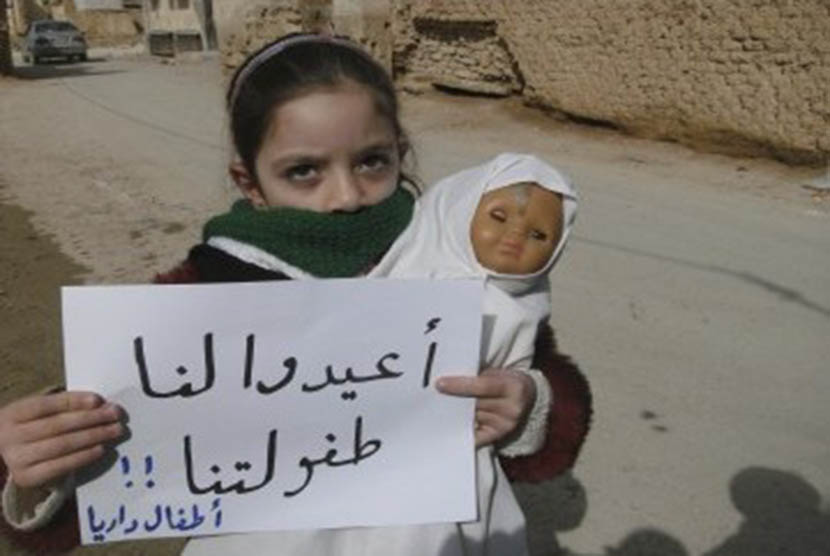By: Muhammad Pizaro
This month marks the six-year anniversary of the outbreak of civil war in Syria. the United Nations (UN) has estimated that 450.000 people have been killed by six-year war and 4.9 million Syrian refugees have registered with the UNHCR since the start of the Syrian civil war in 2011. Of these refugees, 2.3 million are children.
According to UNICEF, the past year has been the deadliest for children since the conflict began at least 652 children killed in 2016 – a 20% increase on the year before. Today, 6 million of children totally depend on humanitarian aid, apart from the 2.3 million children who live in refugee camps abroad and 1.7 million children who do not attend school as a third of Syria’s schools have been destroyed.
The author is lucky getting a chance to conduct the Syrian crisis as a journalist a few years ago. There, the author saw a close portrait of Syrian society affliction. They lived in fear and starvation. They hoped people speak up, especially Indonesian and their government. They knew as a largest Moslem country, Indonesia has been caring about the humanity. The number of the humanitarian agencies from Indonesia has involved to demulcent many crises in the world.
Unfortunately, the attention of the government to the Syria crisis is feeble. Issues being popular in Indonesia are just about terrorism of ISIS. Finally, on the contrary the real of Syria crisis has been marginal. We admit that ISIS is dangerous, but allowing the starvation and suffering is dangerous too. Moreover, the Syrian society also has rejected ISIS’s attendance due to the track record of their violence.
My reporting experience has shown the situation of alarm. They do not have a home anymore. Life as a Syrian child has been traumatic, losing members of their family, constantly living in danger. Many of them have lost of a chance to school as regime attacks. Finally, they must go to school lifelessly by reason of the fear of regime attacks. UNICEF estimates that 2.8 million Syrian children are out of school in as much as the conflict.
If you feel sad by cause of the tragedy of Aylan Kurdi and omran daqnessh, you must know that there are many Omran Daqneesh and Aylan Kurdi in Syria.
But interestingly, they welcomed the volunteers and journalists splendidly. They were trying to provide food, even though they themselves were hungry. It is because they know that being hungry is infliction.
One thing that makes the author more emotional is their concern toward Indonesian people. They said, "Although we do not know where your country is and never come to your country, but you know in every our prayer, we never forget to pray for Indonesian people because we do not want that our suffering also occurs in your land, " he said.
For that, they say, the best thing for the people of Indonesia in responding to the tragedy is not to go to war to Syria, but by working on humanitarian issues. In cutting edge era, documenting the whole image is more effective to touch the public awareness.
A number of humanitarian activists, including the author, had conveyed the situation to Indonesian Deputy Foreign Minister, A.M Fachir, a few years ago. Hearing reports of volunteers, Fachir said that it’s very important for the government to build synergies with humanitarian agencies.
"There are about four million Syrian refugees spread in Jordan, Lebanon, Turkey and Iraq. They need help. But what we do for them is still not enough," he said.
That’s why the role of government is needed to involve in responding the conflict. The government is able to cooperate with the agencies to send humanitarian aid, especially in the besieged area. As of February 2017, the UN estimates that there are some 643,780 people living in 13 areas under siege inside Syria. This means civilians have been deliberately denied aid including food and medicine. By utilizing the political power, the government is expected to solve this problem.
Besides, the government is able to ask the other countries to end the problem of crisis. It is because the attention of the world is still weak. Hence, Indonesia should not abstain again in UN meeting in deciding the human rights situation in Syria. Actually, Indonesian voice, as the largest Moslem country, will be a reference for the other countries in humanitarian issue in the Middle East.
The author has uniformity of the UN’s point of view seeing that the Syria conflict has produced the biggest refugee and displacement crisis of our time and has demanded a huge surge in solidarity.
“Syria is the biggest humanitarian and refugee crisis of our time, a continuing cause of suffering for millions which should be garnering a groundswell of support around the world,” said UN High Commissioner for Refugees Filippo Grandi.
* The author is humanitarian journalist and Internasional Observer at the Center for Islamic and Global Studies


